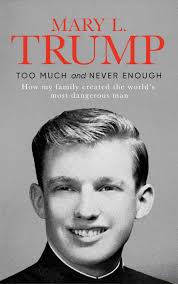 There seems to be no end to the number of books devoted to America’s flawed president but certainly the two dominant ones this summer have been John Bolton’s The Room Where it Happened and now Mary Trump’s Too Much and Never Enough.
There seems to be no end to the number of books devoted to America’s flawed president but certainly the two dominant ones this summer have been John Bolton’s The Room Where it Happened and now Mary Trump’s Too Much and Never Enough.
Bolton’s book topped the New York Times best-seller list last time I looked but I expect it will be knocked off shortly by Mary Trump’s intimate portrait of her uncle’s early days, and how his character and outlook has never really changed. Mary Trump’s book sold 950,000 copies within days of its release and should be nicely past a million by the time you read this.
I have copies of both books but confess to having given up on Bolton’s long snoozer once Mary’s much shorter and more entertaining book came out. Mary’s is just over 250 pages. Both books have been extensively reviewed since their release and of course the White House’s attempt to block publication of them and muzzle their authors only ended up backfiring and turning both books into bestsellers.
In Bolton’s case, I found the numerous reviews sufficient to get the gist of what he was saying: the book is just too pedantic and self-serving to tolerate unfiltered.
Mary’s book, on the other hand, is a compelling fast read, as you’d expect a book would be when written by someone actually in the Trump family. If indeed she believes Uncle Donnie is the world’s most dangerous man, then she’s a brave lady, as she demonstrated last Friday evening on CNN, when she ably rebutted Trump’s belated attempts on Twitter to discredit her.
I think most readers can safely disregard White House flack Kayleigh McEnany’s blanket dismissal of the book as “a pack of lies,” given that she also confessed at the same time she hadn’t read the book.
Perhaps Mary focuses too much on the early days of her father (Fred Junior) and his early death by alcoholism, largely caused by some abominable treatment by his younger brother (Donald) and their father, Fred Senior. But an understanding of this relationship is crucial to the book’s thesis, given that Mary notes near the end that “Vladimir Putin, Kim Jong-un, and Mitch McConnell, all … bear more than a passing psychological resemblance to Fred.”
I found the book more compelling the further you get into it. The last few chapters are especially insightful and pretty damning, judging by the extent to which I underlined it. Below are a few examples:
Protected from his many failures

The last full Chapter (14, A Civil Servant in Public Housing) starts with an idea I’ve not seen discussed elsewhere, as Mary sees parallel “through lines” from the House where the Trump family was raised to Trump Tower to the West Wing; and from Trump Management to the Trump Organization to the Oval Office. The first reveals a progression of controlled environments that took care of Donald’s material needs, while the second constituted “a series of sinecures in which the work was done by others and Donald never needed to acquire expertise in order to attain or retain power …. All of this has protected Donald from his own failures while allowing him to believe himself a success.”
Also intriguing is the interpretation that — far from Donald taking advantage of others, which he certainly did — “there was a line of people willing to take advantage of him.” This started with the New York tabloid press in the 1980s, which “discovered that Donald couldn’t distinguish between mockery and flattery and used his shamelessness to sell papers.”
By 2004, Donald’s finances were “a mess,” Mary writes, at which time his “empire” consisted of “increasingly desperate branding opportunities such as Trump Steaks, Trump Vodka, and Trump University.” And this made him an easy target for Mark Burnett, who saved his career by convincing Trump to be the star of the reality TV show, The Apprentice, where he played the part of the successful businessman he wasn’t in reality.
She also recounts the many times his father bailed him out, including at least one of his failing casinos (It seems the House always wins, unless Donald Trump owns it). As she notes:
“Nobody has failed upward as consistently and spectacularly as the ostensible leader of the shrinking free world.”
In short, Mary concludes, her uncle “was neither self-made nor a good dealmaker … His real skills (self-aggrandizement, lying, and sleight of hand) were interpreted as strengths unique to his brand of success.”
Mary’s credentials as a psychologist also make her observations relevant, such as this shocking sentence:
“Donald today is much as he was at three years old: incapable of growing, learning, or evolving, unable to regulate his emotions, moderate his responses, or take in and synthesize information.”
The stress of distracting from his vast ignorance
While his fundamental nature hasn’t changed, he has experienced more stress since taking on the presidency. However, she explains:
“It’s not the stress of the job, because he isn’t doing the job, unless watching TV and tweeting insults count. It’s the effort to keep the rest of us distracted from the fact that he knows nothing — about politics, civics, or simple human decency — that requires an enormous amount of work.”
If that doesn’t scare voters, I don’t know what would!
Or this:
“We must dispense with the idea of Donald’s ‘strategic brilliance’ in understanding the intersection of media and politics. He doesn’t have a strategy; he never has …. lying, playing to the lowest common denominator, cheating, and sowing division are all he knows.”
Except for a short epilogue, the books ends with this sentence:
“And so far, he’s gotten away with everything.”
I may or may not finish reading Bolton’s book but am pretty tired of reading about this erratic president. Initially I read several of these books as an attempt to discern the possible impact on the economy and stock markets: as in this compendium of reviews published almost two years ago. Looking at it all through this site’s prism of Financial Independence, it’s clear that virtually everyone’s financial well being is potentially threatened, despite the current disconnect between the dismal economy and the resurgent stock market. About all we can do is to maintain proper asset allocation.
There’s precious little Canadian investors can do about it and not much Americans can do either, apart from working to vote him out in November.
I suspect I am like most appalled observers of this presidency: both repelled and drawn to the train wreck in progress, wondering whether the tragic denouement will indeed be between this November and January 2021.
I can’t imagine an additional four years: only time will tell if Mary Trump achieves her admitted goal to “take Donald down.” See also The New Abnormal podcast aired Tuesday in which she is the featured guest of Rick Wilson and his co-host. And The Atlantic has just published an insightful article that makes for a nice complement to Mary’s book: Donald Trump is a broken man.


Thank you for reviewing both these books and sharing your opinions. I hope the US makes a good choice in November.
I think I would like to read her book too. Thanks for the warning about Bolton’s book. ha ha